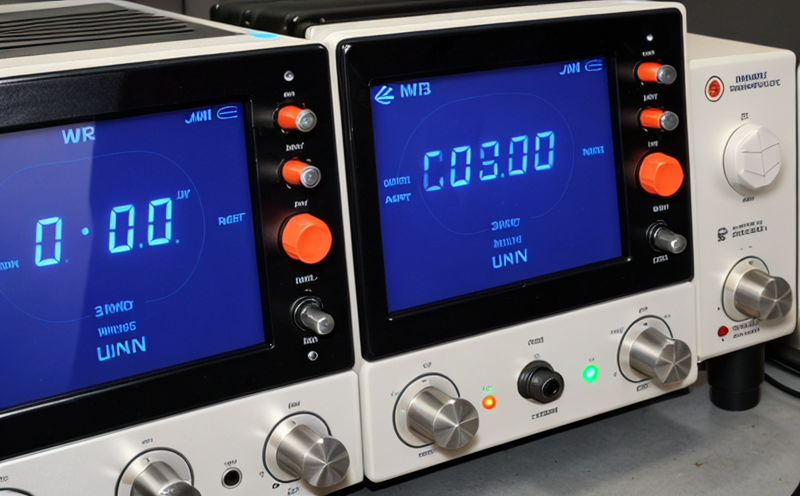EN 303 204 Wireless M-Bus Smart Meter RF Testing
The EN 303 204 standard is a European framework that ensures interoperability and reliability of wireless communication in smart meters, particularly in the context of the M-Bus (Metering Bus). This service provides comprehensive testing to ensure compliance with this stringent international standard. The M-Bus system is designed for energy metering applications, allowing the transfer of data between devices over a low-power radio frequency link.
The EN 303 204 standard covers aspects such as the physical and logical layers, network access control, security, and interoperability requirements. Compliance with this standard ensures that M-Bus smart meters can operate reliably in diverse environments while maintaining secure data transmission. This is crucial for the growing Internet of Things (IoT) ecosystem where seamless communication between devices is essential.
Our testing service covers a range of critical parameters including frequency band, modulation type, signal strength, and interference resistance. We use state-of-the-art equipment to simulate real-world conditions that M-Bus smart meters might encounter in the field. This includes various environmental factors such as temperature, humidity, and electromagnetic interference (EMI) levels.
The testing process involves several key steps:
- Preparation of test specimens: Ensuring all devices are calibrated and ready for testing.
- Setup of test scenarios: Simulating different operational conditions to assess the robustness of the M-Bus smart meters.
- Data collection: Gathering comprehensive data on performance under various conditions.
- Analysis and reporting: Providing detailed reports that meet industry standards and requirements.
The importance of this testing cannot be overstated, especially in regions where interoperability is critical for maintaining a robust smart grid infrastructure. By adhering to the EN 303 204 standard, manufacturers can ensure their products are reliable, secure, and compatible with other M-Bus devices.
| Test Parameter | Description |
|---|---|
| Frequency Band | The specific frequency range used for the wireless communication. |
| Modulation Type | The type of modulation employed to ensure efficient data transmission. |
| Signal Strength | The strength of the signal at various points in the network. |
| Interference Resistance | The ability of the device to function correctly despite external interference. |
In conclusion, our EN 303 204 Wireless M-Bus Smart Meter RF Testing service is designed to help manufacturers and quality managers ensure their products meet the highest international standards. By providing robust testing services, we contribute to the reliability and security of smart metering solutions in a rapidly evolving IoT landscape.
Applied Standards
| Standard | Description |
|---|---|
| EN 303 204:2019 | The European standard for wireless communication in smart meters, including M-Bus systems. |
| ISO/IEC 17025 | International standard for the competence of testing and calibration laboratories. |
The EN 303 204:2019 standard is pivotal in ensuring that wireless communication devices, particularly M-Bus smart meters, meet stringent interoperability and reliability requirements. This ensures that these devices can operate effectively across different environments without performance degradation.
The ISO/IEC 17025 standard further enhances the credibility of our testing services by ensuring that we adhere to internationally recognized best practices in laboratory operations and management. This combination of standards guarantees a high level of accuracy, consistency, and reliability in our test results.
Quality and Reliability Assurance
- Comprehensive testing across all relevant parameters as specified by EN 303 204:2019.
- Use of advanced equipment to simulate real-world conditions for enhanced accuracy.
- Detailed data analysis to ensure compliance with the standard and industry best practices.
- Regular calibration and validation of testing instruments to maintain precision.
Our commitment to quality is reflected in our rigorous testing procedures. We employ advanced equipment capable of simulating various environmental factors that M-Bus smart meters might encounter in a real-world setting. This ensures that the tested devices are not only compliant with EN 303 204:2019 but also reliable under diverse operational conditions.
The detailed data we collect during testing is critical for identifying any potential issues and ensuring that all aspects of the device function as expected. Regular calibration and validation of our instruments ensure that our results are accurate and consistent, adding to the credibility of our testing services.
International Acceptance and Recognition
- The EN 303 204:2019 standard is widely recognized in Europe and beyond for its stringent requirements on M-Bus smart meters.
- This standard ensures interoperability, reliability, and security across different devices and networks.
- ISO/IEC 17025 accreditation further enhances our reputation as a leading provider of testing services.
The international acceptance and recognition of the EN 303 204:2019 standard is a testament to its importance in the smart metering industry. This standard ensures that M-Bus systems can operate reliably across different environments, enhancing the overall performance of smart grids. The widespread adoption of this standard reflects its effectiveness in promoting interoperability and security.
Our ISO/IEC 17025 accreditation is another factor contributing to our international reputation as a leading provider of testing services. This accreditation ensures that we meet the highest standards in laboratory operations and management, providing clients with confidence in the accuracy and reliability of our test results.





